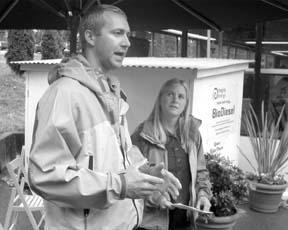Entrepreneurs open a new fuel station near the ferry terminal.
Imagine a chemical process that cuts, say, 100 million years off of nature’s ferns-to-dinosaurs-to-hydrocarbons method of making fossil fuel, yet is simple enough to do in your garage with left-over ingredients.
Imagine a fuel that burns cleanly, extends engine life, and smells, if not like perfume, then more like a restaurant than a refinery.
Do that, and you’ve got biodiesel, a vegetable-based motor fuel now being marketed on Bainbridge Island by the fledgling Imagine Energy Company, a venture of young eco-entrepreneurs Nick Rohrbach and Morgan Roose.
“Three years ago, I read an article about how to make biodiesel,” Roose said. “I had brewed beer, and I figured it wouldn’t be that hard.”
The ingredients: alcohol, either grain- or wood-based, lye, and fatty oil, generally soy-based.
“But you could use any kind of fatty oil, including the leftover oil from French fries,” Rohrbach said.
The lye acts as a catalyst in a reaction that produces glycerine, which can be used as a base for soaps and cosmetics, and a burnable diesel fuel.
While the pair have the technical capability to produce biodiesel, they don’t have the permits, the infrastructure or the paper-handling capability to tackle a heavily taxed and regulated business.
So Imagine buys its biodiesel from Iowa, then acts as a local distributor and retailer.
Last week marked the debut of their Bainbridge Island “station” – a 500-gallon tank-and-pump outlet wedged between Jack’s Garage and a dumpster on the road to the ferry terminal, with two deck chairs and an umbrella constituting the office.
“Its been a little slow,” Rohrbach said, “but we hope it will pick up when more people know we’re here.”
For the few who have turned to biodiesel, the station is a terrific convenience.
“I bought a diesel-powered car in January 2001 just so I could use biodiesel,” said retired chemist Norm Johnson, filling up on Thursday afternoon, “but I had to go to Seattle to get it.
“I’m delighted to find out it’s available here on Bainbridge.”
Most diesel engines can use biodiesel without modification, Roose said, although some older engines need to have their natural-rubber fuel lines replaced. Emissions are generally lower than for conventional diesel, with sulfur emissions eliminated completely.
Engines can run on pure biodiesel, Roose said, or it can be mixed in virtually any proportion with conventional diesel. Vehicle performance is indistinguishable.
“I can’t tell the difference, but it smells a whole lot better,” said Johnson of his 2002 diesel Volkswagen.
Cost is presently an issue – biodiesel costs roughly $1 per gallon more than conventional diesel. But Rohrbach hopes that prices will come down as volume increases, which is part of Imagine’s mission.
“I thought the best way to get people to use it was to go out and sell it to them,” he said.
Most of Imagine’s action so far has come not from the station, but from their 1,500-gallon tank truck, an upgrade from hauling barrels in the back of the biodiesel-powered Ford pickup.
“The fuel comes into Tacoma, and we go down there, pick it up, and distribute it around the area, in Olympia and Port Townsend,” Rohrbach said.
A source of considerable demand is the harbor, where some boaters prefer the relatively odor-free biodiesel to the notoriously noxious fumes from diesel-powered marine engines.
“We’ve hauled five-gallon cans down to the boat, and customers have made trips to shore to buy out of the pickup,” Rohrbach said.
The pair developed an interest in alternative fuels by looking at the existing ones. Roose, who grew up on Bainbridge Island, was a biologist and toxicologist for the state Department of Ecology when she became a convert.
“I sold my Volvo, bought a diesel car and started buying biodiesel at a marina,” she said. She helped form a fuel co-op in that area, then decided to bring the product back home.
“I got tired of working at the DOE,” she said. “Bainbridge didn’t have biodiesel, and I thought this was a good market for it.”
Rohrbach is a native of Wyoming, who spent time working in that state’s energy industry before deciding “that you don’t need to be punching a lot of holes in the ground to get fuel.”
Both think the fuel has enormous potential, particularly for transit systems and in the maritime industry, where diesel engines are most common.
But because of the limited availability of raw material and the political clout of the oil industry, they question whether it will be much more than a supplement any time soon. Still, the attractions are legion.
“It’s home-grown, so you don’t need any wars for it,” Rohrbach said. “It boosts the local economy. Because of its higher lubricity, engines last forever.
“And it’s renewable – a form of solar power.”


